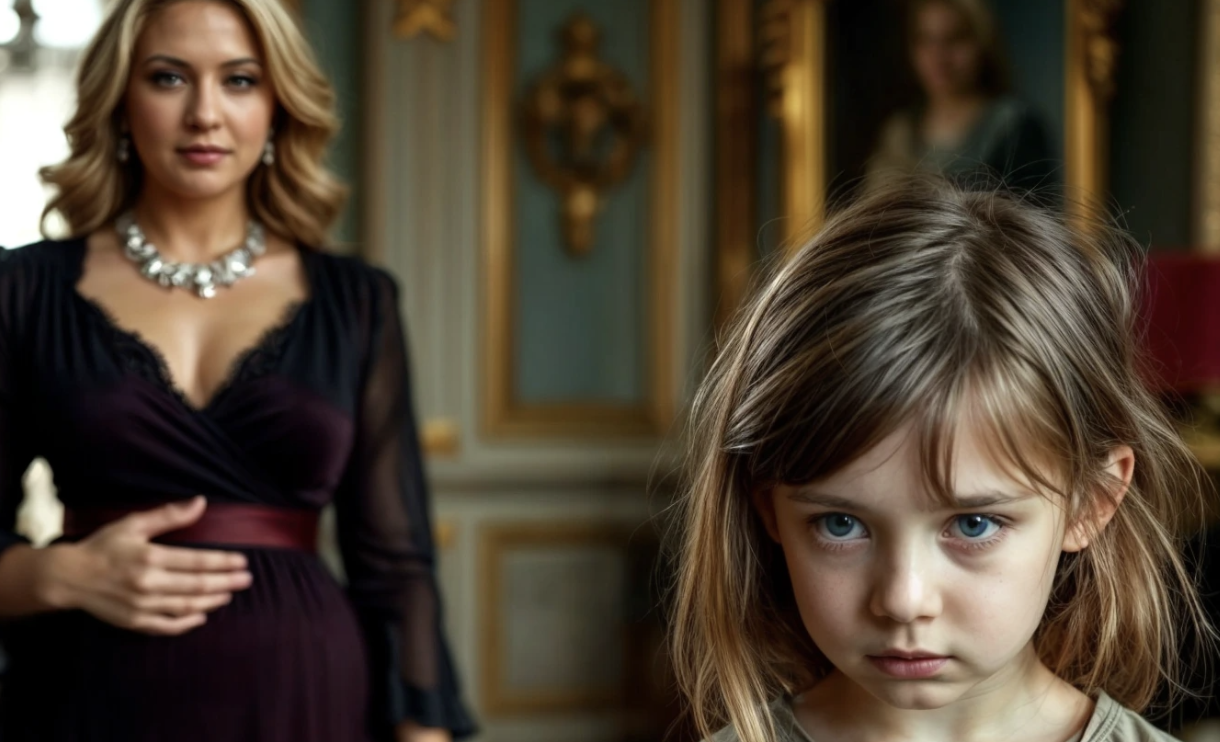On a stormy day, when the wind was knocking on the windows of the large Stepanov mansion as if reminding of the impending loneliness, an event occurred that not only changed the course of life for the wealthy widow but literally saved her from a bleak and joyless future. After the death of her husband — the respected architect Evgeny Alexandrovich — Oksana was left alone in the huge house, where just recently there had been laughter, the hustle and bustle of children, noisy family dinners, and celebrations. This house was built as a symbol of love, family, and generational continuity. But life, as often happens, decided otherwise.
The children, who grew up within these walls, had long since settled abroad, moving there the business they had built for decades. The grandchildren were raised far from their grandparents, in a different culture, speaking a different language. Evgeny Alexandrovich took the separation painfully, for it was precisely for a large, friendly family that he had created this spacious house, filled with light and comfort. He could not imagine it empty, deprived of children’s laughter. Perhaps his heart foresaw trouble — the first attack came suddenly, like a blow of fate. Lying in the hospital, he took his beloved wife’s hand and whispered:
— If anything happens to me, promise me… Don’t sell the house. Keep it for the children. Let them know there is always a place to return to.
These were not just words but a testament that became the meaning of Oksana’s life after his passing. A year later, a second heart attack took Evgeny forever. And before the end, he repeated again: “Oksana… keep the house…” These words were forever imprinted in her heart.
The children and grandchildren came to the funeral, but their visit felt more like a formal duty than an expression of grief. The relatives looked at the overseas heirs coldly, even with reproach. They left their parents alone and now seemed to not understand the full depth of what Oksana felt. In the evening, the son and daughter tried to persuade their mother to move to Serbia with them, telling her about the country’s beauty, ease of life, and closeness. But she only gently but firmly replied:
— I gave your father my word. As long as I live, the house will remain here. This is all I have left of him.
Her son looked at his mother gratefully and said:
— Thank you, Mom. You are a true person.
And so she was left alone. The huge house, almost an echo of a former life, became too spacious for one woman. Oksana dismissed most of the staff, keeping only a maid and a security guard. Managing her husband’s company did not take much time — mornings began with a brief meeting with the deputy, reviewing mail and orders, and by lunchtime she was free. But she did not want to return home. She began to walk around the city, enter shops, cafes, killing time so as not to end up in empty rooms where every corner reminded her of her husband.
One day, walking down the street, she noticed a sign: “Room for rent to a respectable single woman.” Thoughts raced: “Why not? Am I not respectable? Am I not alone?” And she decided. Soon two female students moved into the house, taking the daughter’s room, which the owner had converted into a mini-hotel. The noise of youth warmed the house a little, reminding of times when the family was large and cheerful.
But the real change came with the arrival of Ali Jalalovich — a graduate student at the Military Medical Academy preparing for his doctorate. The young man worked in the cardiology department of the regional hospital, and all the women in the clinic were charmed by him. Handsome like an Arab prince, with eyes as dark as shadows, he was confident and knew what he wanted from life. Ali was looking for a woman with the appearance of a queen — mature, refined, experienced. And he found that woman in Oksana.
The owner of the large house, a successful businesswoman, a woman who had gone through life’s trials, seemed to him the perfect partner. He did not want the chaos of small children, diapers, and nighttime crying. Those stages were behind Oksana. In the house, Ali immediately felt comfortable: cleanliness, order, silence — all spoke of the good taste of the hostess. Only sometimes the loud laughter of the students disturbed his inner harmony.
Over time, Ali asked Oksana to free the house from the tenants, wanting to take not one but both rooms. She could not refuse — how could she resist that look full of strength and charm? “They sure know how to disarm with just a glance,” she thought, recalling Ali’s eyes, dark as Turkish coffee.
After the girls left, Ali gradually began to act like the master of the house. He paid not only for lodging in two rooms but also half of the utilities, generously shared with the maid and the security guard. Oksana didn’t even notice how their relationship began to change. She found herself in the role of his other half, although formally nothing had changed yet.
At first, she protested:
— Ali, I am 52, and you are not even forty. How will we go to the theater together? As what?
Ali only smiled:
— Of course, as a young admirer! What’s wrong with that? Who, if not a beautiful, well-groomed, intelligent woman, deserves the love of an interesting, educated, and wealthy man? Especially since I don’t need your money. If that were the case, you would have kicked me out long ago.
Such words gave Oksana confidence. She began to openly defend their relationship, especially when hearing hints or judgment from others:
— He is a self-sufficient person, and he spends more on me than I do on myself!
Indeed, soon Ali was promoted — he was appointed head of the cardiac surgery department. In honor of this event, he proposed a joint trip to his homeland. Oksana was a little worried: how would Ali’s parents receive her? But he reassured her, promising they would stay at a hotel.
On Friday evening, they flew out. Two days were not enough to take in all the beauty of the East, but even what Oksana saw was enough to understand — they know how to live truly luxuriously there. Much seemed excessive, ornate, even irrational, but she tried not to judge, to observe as if watching a fairy tale. She felt like a guest in a foreign world, where every movement, every object spoke of magnificence and wealth.
Returning home from the eastern journey, Oksana felt deep relief — not only because she endured the difficult flight and change of climate, but also because she remained on native soil. Despite the fact that children and grandchildren lived far away and sometimes her heart ached from loneliness, she understood: leaving her homeland meant betraying her husband’s memory, his testament, the very spirit of the house he built for the family.
— After all, it’s good I didn’t agree to leave my native country, — she said aloud, standing by the window and looking at the old garden where her own children once ran. — Here are my roots, here is my life, here is everything I love.
Of course, she missed the children and grandchildren. Each of their rare visits was like a holiday, filled with laughter, noise, and memories. But they quickly returned abroad, leaving only the warmth of hugs and the shadow of parting behind.
One day, walking home on foot — a useful habit Oksana had kept since searching for ways to fill her days after Evgeny Alexandrovich’s passing — she noticed children near her gate. There were two kids — a boy and a girl about nine years old. They sang Gypsy songs with amazing skill and deftly juggled colorful balls. Their movements were agile, and their voices were pure and ringing, like perfectly tuned musical instruments.
Oksana came closer and learned that they were brother and sister — Pasha and Zlata. At first glance, it was clear they were related but very different. The girl was more fragile, with big eyes and a worried look, while the boy looked more confident, almost defiant. She felt not just sympathy for them but a lively affection.
The woman took two 200-ruble bills from her wallet and handed one to each. The children beamed:
— Thank you, kind Aunt Oksana! — exclaimed the boy, and the girl added, — We will never forget you!
Then Oksana brought them a fresh orange, carefully sliced into wedges. The children took them cautiously, holding the peel as if it were a little treasure. They did not hurry to eat, savoring every moment, every bit of kindness given by the chance meeting.
“Brother and sister, but how different,” Oksana thought, watching them with warmth in her heart.
But fate does not always spare kind people. One late evening, someone persistently rang the mansion’s gate. The security guard, hearing the sound, went outside and saw there the lonely figure — the Gypsy girl, Zlata. He immediately began scolding her for disturbing and demanded she leave so as not to bother the “respectable people.”
The noise brought Oksana out. Seeing the frightened and crying face of the girl, she gently approached, took her hand, and led her inside:
— What happened, child? Why are you crying? Where is your brother?
Zlata covered her face with her hands and spoke through sobs:
— Today… no one gave us anything… we went into a store, wanted to take bread… I hid a loaf in my jacket, and Pasha took sausages and a can of stew… But the guard noticed us and ran after us. We ran across the road… and Pasha was hit by a truck! People ran up, everyone stood around him… I wanted to go closer but saw the same guard and ran away… And now I’m afraid to go home…
The girl sobbed again, barely standing. Oksana held her close like her own granddaughter and whispered:
— Don’t be afraid, little Zlata. Tonight you will stay with me. You will sleep in the maid’s room, and tomorrow I will take you home myself. Just tell me where you live?
— In a workers’ settlement, in a barrack. We live with a big family: with the older sister, her children, grandmother, and grandfather. The sister’s husband went to Moscow, and grandmother has been bedridden for a long time. The sister takes care of her.
Oksana immediately called the maid, asked to feed the girl something warm, then to wash and dress her. Meanwhile, she brought from the wardrobe her daughter’s clothes, which the daughter had long outgrown. They fit Zlata perfectly.
After the bath, the girl was dressed in soft pajamas and laid a place for her in a large folding armchair. But even in such a cozy corner, Zlata could not find peace — she kept sobbing in her sleep, crying out her brother’s name.
In the morning, Oksana took Zlata home herself. A police car was already standing near the barrack, people were gathering. Someone was shouting, someone was crying. Oksana got out of the car with the girl, supporting her by the hand. She greeted the police and answered several questions. At that moment, Zlata turned and waved happily:
— Thank you, Aunt Oksana! I will never forget you!
That day left a deep mark on the woman’s soul. All day she could not get out of her mind the image of the little dirty children surrounding the police car, Zlata’s exhausted sister, the endless grief on the faces of all these people. How much suffering in the world! How many families live on the edge, how many children grow up without protection and love…
And in the evening, an unpleasant surprise awaited her. Ali, returning from work, learned that a Gypsy girl had spent the night in the house and threw a real tantrum:
— Please, never bring such people into our house again! They may have lice, fleas, infections! Can you imagine how to get rid of that later?! If you love me, promise me there will be no more of them in our house!
Oksana was shocked not only by his arrogance and harshness — for he used to be so polite, even a bit sweet — but also by how he emphasized the words “our house.” At that moment, she realized what was really going on. Everything became clear: Ali was not just a young man she had accepted into her home. He had his eyes on the inheritance! On the house she had promised to keep for her children and grandchildren. How had she not guessed it before?
Hardly holding herself together, Oksana said calmly but with a note of warning:
— Ali, I don’t recognize you. You raise your voice because a poor child was in the house? I didn’t know you hated children so much.
Her husband suddenly softened, started talking about care, science, wanting to get a doctoral degree. But these words could not hide the truth. Especially when he said again: “our house.”
“No, dear, this house will never be yours,” Oksana thought and decided to put an end to this game:
— Of course, I want you to get your doctoral degree and then become a professor. Even an academician if you want! But this house was built by my late husband; I promised to keep it for our family — for the children and grandchildren. But not for a young admirer who, it seems, married me only for this estate!
And then her heart, weakened by recent events, could not stand it. Oksana’s eyes opened wide, she grabbed her chest and began to fall. Ali caught her and sat her in a chair, but she could not even sit, slowly sliding to the floor.
He shouted for the guard and maid, asking for help to carry Oksana to the car. At the hospital, Ali ordered her to be taken to the cardiac surgery department. The staff was already waiting for his instructions.
But at that moment, Ali suddenly hesitated. He stood in the doctors’ lounge, listening to questions: “When to start stenting?” — and could not answer. His thoughts were elsewhere: if Oksana survived, she would suspect him of every mortal sin. And if she became disabled, their life together would become a torment. Better to end it now.
Meanwhile, Oksana, who was given an IV drip, came to a little. She did not understand where she was or who brought her there. Suddenly she heard someone calling her name. Turning her head, she saw a small figure climbing through the window — Zlata. Within seconds, the girl was standing by the bed:
— Aunt Oksana, are you sick? My sister was feeding grandmother and suddenly shouted: “Run quickly to the hospital, Aunt Oksana is sick!” So I ran. I don’t know how I knew to climb the ladder. It was as if someone helped me.
Out of gratitude and joy, Oksana cried. But at that moment, the monitor showed a sharp deterioration in the patient’s condition — she lost consciousness again.
Zlata ran into the corridor and shouted:
— Auntie is dying! Auntie is dying!
The noise caught the doctors’ attention. They rushed out of the lounge and ran to the intensive care unit. One of the surgeons made a decision:
— Take her to the operating table! Looks like Ali Jalalovich is in a stupor — we act under my responsibility!
The operation was successful. Oksana’s heart beat evenly again, blood flow in the artery was restored. By the fifth day, doctors were preparing her for discharge.
Ali appeared at her bedside only once — during the student rounds. All the doctors praised her luck, called her fortunate because the timely operation saved her life. Someone mentioned that strange girl who literally woke the whole department and then disappeared.
Oksana smiled, recalling how Zlata climbed into the ward through the window.
On the day of discharge, a pleasant surprise awaited her — her children had come! As the maid told her, Zlata ran to them in terror, reporting that the hostess was taken to surgery and that the relatives needed to be urgently informed. The children immediately gathered and flew in as a family.
Oksana hugged her grandchildren, daughter with son-in-law, son with daughter-in-law. The house again echoed with familiar voices, laughter, footsteps — everything she had waited for so long. She was prescribed to rest at least 12 hours a day, so the children tried not to tire their mother with conversations. They bought her a comfortable chair with electric drive so she could freely move around the house and yard.
In the joyful bustle of the family, she completely forgot about Ali, as if he had never existed.
When he came to collect his things, he looked dim and frightened. Oksana took his hand, placed the wedding ring he had given her into it, and squeezed his fingers tightly:
— Good luck, doctor.
Ali left, giving up the house he dreamed of. And Evgeny Alexandrovich’s son, as his father had predicted, decided to return. He entrusted the company to his sister and brother-in-law, who preferred to stay in Serbia. And he decided to head his father’s architectural bureau — after all, he had the appropriate education.
Now Oksana could calmly regain her strength. No one judged her for helping Zlata’s family. Her daughter and son-in-law promised to visit more often.
Thus, under the roof of her native home, the big family gathered again — just as its creator, Evgeny Alexandrovich, once intended.


